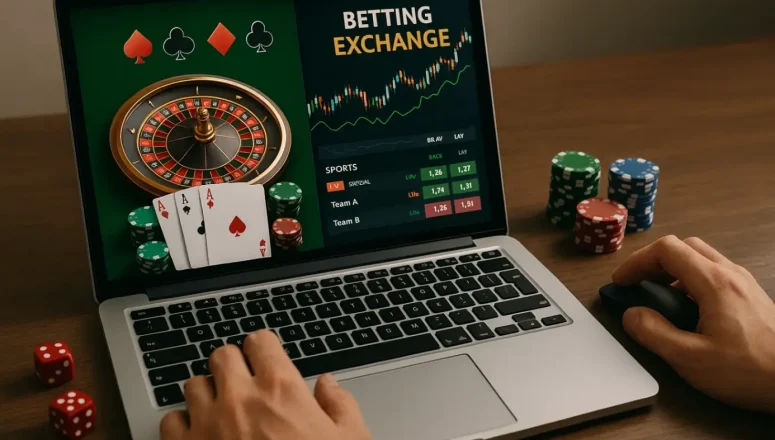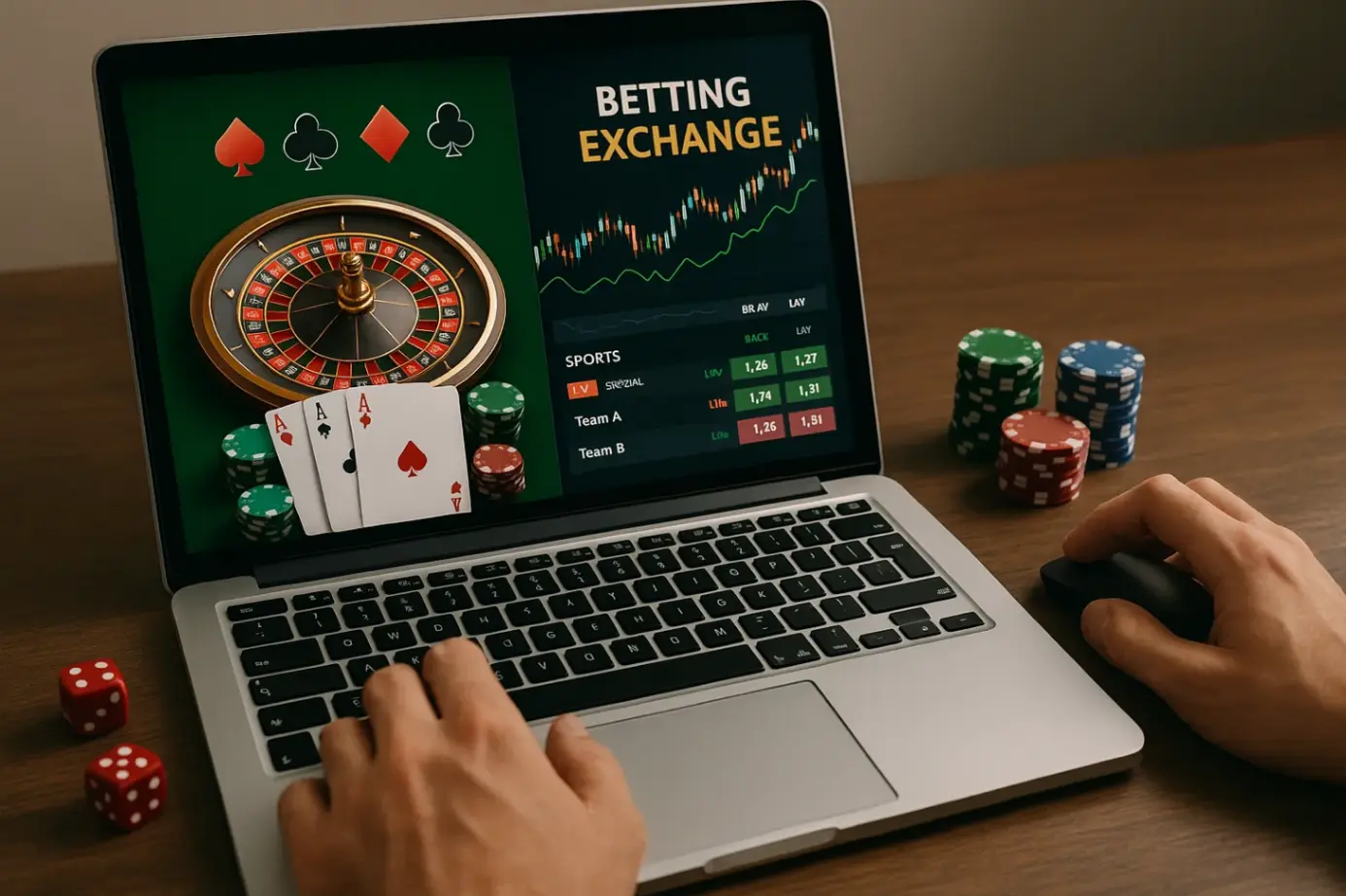Online casinos have long captivated players with their digital allure, promising convenience, variety, and the thrill of instant wins. But a new wave of innovation is reshaping the landscape even further—betting exchanges integrated directly into online casinos. These platforms are not just expanding wagering opportunities; they’re completely redefining the relationship between players, odds, and game outcomes. The synergy of traditional casino play and peer-to-peer betting is a bold step toward decentralization, customization, and real-time dynamism.
The Evolution of Online Casinos: From Slots to Smart Markets
The digital gambling world has evolved far beyond simple slots and virtual tables. In the early 2000s, the focus was on transitioning land-based casino experiences into browser-based simulations. With the advent of mobile platforms, real-time streaming, and gamification, user expectations grew rapidly. Yet for all their technical advances, traditional online casinos retained a fundamental limitation: players wager against the house.
Betting exchanges disrupt this model by enabling users to bet against each other instead. This peer-to-peer structure breaks the mold of fixed odds and empowers players to act as bookmakers themselves, offering odds and setting limits. By blending this system into online casino frameworks, a new hybrid model is emerging—one that democratizes betting and aligns more closely with dynamic market behavior rather than rigid house rules.
How Betting Exchanges Work Inside an Online Casino
In a traditional sportsbook or casino, odds are set by operators based on sophisticated modeling. Bettors can only accept or reject the odds presented. In a betting exchange, however, users propose their own odds, and other users can match them. The operator’s role is limited to hosting the platform and charging a commission on winning bets.
Within an online casino context, this means a roulette game can evolve beyond a simple spin-and-bet. Imagine a user offering a wager on black 20 paying 10-to-1 instead of the standard odds, and another player taking that bet. The house is no longer the sole intermediary; players negotiate terms, adding depth and interaction.
This model applies not just to sports betting but to casino games, esports outcomes, live dealer contests, and more. With the right interface, such an ecosystem becomes a living marketplace of risk, intuition, and opportunity.
Advantages Over Traditional Models
The integration of betting exchanges within online casinos is not merely a feature—it’s a philosophical shift. It aligns more with decentralized finance and market logic than with classical house-centric gaming.
Key advantages include:
- Better odds for players: Without a built-in house margin, odds tend to be more favorable.
- Dynamic liquidity: Odds shift based on real-time demand and volume.
- Custom betting options: Players can bet on highly specific outcomes, creating niche opportunities.
- Empowerment and engagement: Players become active participants in shaping the market rather than passive consumers.
For seasoned bettors, this also means the possibility of arbitrage—identifying mismatches in odds across markets and profiting from variance. In this framework, betting becomes more akin to trading, and casinos evolve into real-time financial micro-exchanges.
The Real-Time Technology Behind the Revolution
At the core of this evolution is real-time data infrastructure. Betting exchanges require fast and secure communication between parties. To achieve this, most platforms utilize WebSocket connections, serverless microservices, and blockchain oracles for verification.
This real-time architecture allows the odds to update instantly as players offer, match, and cancel bets. Delays or inconsistencies would undermine the entire system, so latency must be kept to a minimum.
Below is a comparison of traditional casinos versus online casinos with integrated betting exchanges:
| Feature | Traditional Online Casino | Casino with Betting Exchange |
|---|---|---|
| Odds control | Set by house | Set by players |
| Profit model | House edge | Commission on wins |
| Game types | Predefined by provider | User-customized options |
| Interaction | Player vs house | Player vs player |
| Liquidity dynamics | Fixed payouts | Market-driven fluctuation |
| Odds volatility | Low | High |
| Strategic potential | Limited | High (trading, arbitrage) |
| Regulatory complexity | Moderate | High |
This transformation also introduces transparency through smart contracts, especially for blockchain-based exchanges. Every bet can be traceable, verifiable, and immutable, adding trust in markets often plagued by opacity.
Regulatory and Legal Considerations
The legal frameworks surrounding gambling are notoriously fragmented across jurisdictions. The addition of betting exchanges further complicates compliance. Traditional online casinos must be licensed and adhere to anti-money laundering (AML) and know-your-customer (KYC) protocols. But when users set odds and match bets among themselves, regulators may interpret this as brokerage or financial intermediation.
Some key considerations include:
- Licensing overlap: Exchanges may require financial market licenses in addition to gambling licenses.
- Market maker regulation: Users who consistently offer odds could be classified as unlicensed bookmakers in some jurisdictions.
- AML compliance: Peer-to-peer bets must still be traceable and compliant with AML laws.
- Consumer protection: Dispute resolution mechanisms become more complex when no house is responsible for odds setting.
This legal ambiguity presents both a challenge and an opportunity. Jurisdictions that can create clear and flexible rules for these hybrid platforms may become the next hubs of gambling innovation, attracting operators and players alike.
User Behavior and the Rise of the Betting Marketplace
The shift toward betting exchanges within online casinos isn’t driven solely by technology. Player preferences are also evolving. Gamblers are becoming savvier, more analytical, and more willing to engage with systems that reward skill and strategy.
This section highlights behavioral shifts supporting the rise of exchange-based casino platforms:
- Increased demand for control: Players want to shape their betting experience, not just click and spin.
- Market literacy: The line between betting and trading is blurring; players follow odds like stock prices.
- Customization over conformity: One-size-fits-all bets are giving way to bespoke wagers crafted by the users themselves.
- Community interaction: Exchanges create mini-ecosystems where reputation, credibility, and negotiation matter.
Social features are key in this context. Chat rooms, public odds boards, and leaderboards all contribute to a marketplace feel. Reputation systems—where users rate each other’s reliability in bet settlement—could emerge as a kind of credit rating for gamblers. This evolution mimics decentralized finance platforms and leverages similar user incentives.
Challenges and Limitations
Despite its promise, the model of betting exchanges within online casinos is not without obstacles. Operators must contend with significant technical, economic, and social friction. Below are the key challenges they face:
- Liquidity barriers: Without enough users offering and matching bets, markets become stagnant. A critical mass of active bettors is required to sustain real-time odds flow.
- Complexity for casual users: While power users may thrive, casual players might find the interface confusing or intimidating. Simplicity is still key to mainstream success.
- Fraud prevention: In a peer-to-peer structure, attempts to exploit loopholes, collude or manipulate outcomes require advanced anti-fraud protocols.
- Responsibility shift: When users offer odds, the platform is no longer the sole guardian of fairness. This opens the door to disputes and reputational risk.
From a business perspective, platforms must balance commission rates carefully. Too high, and the incentive to use peer betting vanishes. Too low, and sustainability suffers. Thus, the architecture of incentive is as crucial as the architecture of code.
The Future: Tokenized Betting, Decentralization, and Gamified Trading
Looking ahead, the convergence of online casinos and betting exchanges is poised to deepen. Next-generation platforms are likely to integrate tokenized betting instruments—digital tokens that represent specific wagers, odds contracts, or outcomes. These can be traded, held, or bundled, echoing the structure of financial derivatives.
The roadmap may include:
- NFT-based odds contracts: Bettors mint NFTs for unique wagers and sell them in secondary markets.
- Prediction token economies: Platforms launch native tokens that reward market-making and accurate forecasting.
- Gamified trading UIs: Odds trading becomes a graphical experience, with volatility indicators, live tickers, and order books.
This trend also enhances interoperability. A user could mint a bet on a roulette outcome, trade it on an open market, and then redeem the token if the outcome hits. Such structures attract not only gamblers but also crypto enthusiasts, arbitrageurs, and prediction market specialists.
Eventually, traditional online casinos may become only one layer in a broader multi-market ecosystem where games, exchanges, and prediction contracts coexist. Platforms that succeed in integrating betting exchanges today are setting the stage for this future convergence.
Conclusion
The rise of betting exchanges within online casinos marks a profound evolution—not just technologically but culturally. By placing control in the hands of the player and embracing real-time, market-driven interaction, these platforms create a more participatory and strategic gambling experience. While challenges remain in regulation, liquidity, and complexity, the potential rewards—both for players and operators—are enormous. As real-time data, decentralized infrastructure, and user-led customization converge, the line between gambling and finance continues to blur. The house may no longer always win—but the market might.


